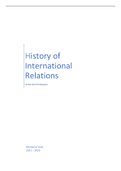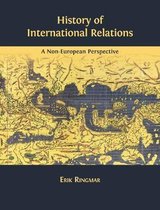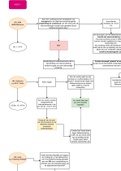History of
International
Relations
Universiteit Antwerpen
Marianne Voet
2021 – 2022
,Introduction
Comparative international systems
What is a “system”?
A system, first of all — any kind of system — is made up of units that act independently of each
other. At the same time, the behavior of one unit in the system always depends on the behavior of
all the others. They are part of the same environment and this influences what they do.
So what is an international system?
Well, it is a system which is made up of political entities — we usually call them “states” — which act
independently but also always together with, and in relation to, all the others. The international
system provides an environment which determines, in broad outline, what political entities do and
what they cannot do expressed in institutions, rules, and norms.
Different international systems have different institutions, rules, and norms. It is no longer possible
to make comparisons because today, there is only one international system, the rest was destroyed.
This is the system that originated in Europe around the 16th century andspread to the rest of the
world as a result of European colonialism in the 19th century.
Today, the rules of international politics are European rules, and the norms and institutions are
European norms and institutions.
What do you study if you are studying “comparative international systems”?
Why must a comparative study of international systems become a historicalstudy?
Norms, rules, institutions
What is a “sovereign state”?
From around the 17th century onward, states have been thought of as “sovereign.” A sovereign state
is a state which exercises supreme authority within a given territory. A sovereign state determines its
own affairs in accordance with its own interests and aspirations, or rather, in the sixteenth century,
in accordance with the interests and aspirations of its ruler.
Sovereignty is a basic institution of the European international system, we can conclude, and as such
it implies a number of social practices and administrative arrangements. There are borders to be
identified and protected, border crossings to be guarded, passports to be issued, flags to be flown
and national anthems to be sung.
These practices and arrangements are, in turn, associated with various rules and norms. One rule
says that all states are equal to each other. All states are the same kinds of entities, doing the same
kinds of things, and they all have the same status as members of the same system. They are
functionally equal, that is, despite the fact that some obviously are far larger, richer and more
powerful than others. As far as the norms of the system are concerned, one example is the norm
which says that sovereignty must be respected. States should not interfere in each other’s domestic
affairs. All states have a right to self-determination.
What do scholars of international relations mean by “anarchy”?
,In an international system of this kind, there is no common authority. And this,
it soon becomes clear, is a problem as each state looks after itself, and no one looks
after, or takes any responsibility for, the system as a whole. The term which scholars of
international relations use for this condition is “anarchy.” The European international
system is an anarchical international system. In an anarchical international system,
states are permanently insecure and war is a constant threat. Since they cannot trust
their neighbors to behave peacefully towards them, each state must be prepared to
defend itself, with weapons if needs be. Yet this, in turn, makes the neighbors feel
more insecure, and they must arm themselves as well. States that fail to respond to this
logic — states that trust in the goodwill of their neighbors — are punished for their
naivety. In the end, the search for security makes everyone more insecure. And every
so often the threat of war is replaced by actual cases of warfare. Not surprisingly, since
its inception, the European international system has been extraordinarily violent. In
the twentieth century alone, almost 100 million people died in European wars.
What can a study of non-European international systems tell us about Europe?
Stateless societies
What are “stateless societies”?
Describe the lifestyle of hunters and gatherers.
Before that, during some 95 percent of human history, we were hunters and gatherers who moved
around in response to the seasonal variations in the availability of food. Since these hunters and
gatherers were constantly on the move, it was difficult for political authorities to exercise control
over them. As a result, hunters and gatherers lived in “stateless” societies.
Why was pastoralism until recently a successful form of social and economic organization?
Pastoralists are people who keep animals such as sheep, cows, horses, and reindeer. Their animals
graze the land, and when they run out of food in one place, their owners move in order to find new
pastures. As a result, pastoralists are difficult to tax and they have little respect for borders.
The interior of the Eurasian continent and the savannas of Africa have been good places for
pastoralists. Here, farming has been impossible to pursue since there is little rain and not many
rivers. What there is, however, is an abundance of grassland.
Relying on their fast horses, the pastoralists raid the sedentary communities of farmers and laid their
hands on all kinds of things that life on the steppe cannot provide. Such “barbarian invasions” are a
theme in both Chinese and Indian history. Indeed, invasions by peoples of the steppes have been
important in European history as well.
, Walls and bridges
What is “culture”?
What is “civilization”? How do civilizations spread?
Why have many societies decided to construct walls around themselves?
. From around the seventeenth century onward, states have been thought of as “sovereign.” A
sovereign state is a state which exercises supreme authority within a given territory. A sovereign
state determines its own affairs in accordance with its own interests and aspirations, or rather, in the
sixteenth century, in accordance with the interests and aspirations of its ruler.
Sovereignty is a basic institution of the European international system, we can
conclude, and as such it implies a number of social practices and administrative
arrangements. There are borders to be identified and protected, border crossings
to be guarded, passports to be issued, flags to be flown and national anthems to be
sung. These practices and arrangements are, in turn, associated with various rules
and norms. One rule says that all states are equal to each other. All states are the
same kinds of entities, doing the same kinds of things, and they all have the same
status as members of the same system. They are functionally equal, that is, despite the
fact that some obviously are far larger, richer and more powerful than others. As far
as the norms of the system are concerned, one example is the norm which says that
sovereignty must be respected. States should not interfere in each other’s domestic
affairs. All states have a right to self-determination.






